
The field of human resources (HR) is undergoing a major transformation. As technology reshapes how we work and organizations adapt to a rapidly changing business landscape, HR professionals must prepare for emerging trends and developments that will impact their human resource career path in the years ahead. This article explores how HR careers are likely to evolve and what HR professionals can do today to future-proof their careers.
For decades, HR has fought the perception that it is mainly an administrative function focused on processes and paperwork. However, the role of HR has become increasingly strategic in recent years. This shift towards a more strategic HR is expected to accelerate further in 2025.
HR leaders will be even more integral in linking HR initiatives to wider business goals. They will rely heavily on data analytics to track employee performance metrics, identify talent gaps, predict workforce needs, and provide vital insights to the C-Suite. The ability to speak the language of business and demonstrate ROI will be vital HR skills.
Meanwhile, routine administrative tasks are likely to be automated during 2025, enabling HR professionals to focus on value-added initiatives that drive business growth.
As the HR function becomes more complex and data-driven, developing expertise in specific HR domains will become a competitive advantage. Pursuing specializations based on interests and strengths will enable HR professionals to assume strategic roles and advance their careers.
Popular specializations likely to emerge in 2025 include:
Gaining transferable skills in areas like critical thinking, analytics, communication, and relationship management will also be valued by employers.
HR teams are already utilizing various technologies to enhance efficiency and productivity. The influx of AI, machine learning, automation and other innovations will drastically change how HR delivers value during 2025.
According to a Gartner report, during 2025, 75% of enterprise applications will incorporate AI and machine learning, including those used for recruiting. Leveraging AI in recruitment helps streamline processes by automating repetitive tasks such as resume screening and candidate sourcing, enabling recruiters to concentrate on more strategic elements of talent acquisition. A Deloitte survey revealed that organizations using AI in recruitment have experienced a 32% reduction in time-to-hire and a 44% boost in retention rates.
Routine administrative tasks will be handed over to HR chatbots. Recruiters will use intelligent screening tools powered by AI. VR may be used for more immersive employee training. Predictive analytics will transform talent management and succession planning.
For HR professionals, the ability to implement and leverage these emerging HR technologies will be imperative to remain competitive. Having a technology-first mindset and continuously upskilling to keep pace with innovations will future-proof HR careers.
With millennial and Gen Z employees poised to dominate the workforce, the employee experience is taking center stage. HR’s role in curating personalized, empathic and meaningful employee experiences through the entire talent lifecycle will grow exponentially in 2025.
Forward-thinking HR leaders are realizing that enhancing EX leads directly to stronger talent attraction, engagement and retention. Many organizations will have dedicated ‘Employee Experience Officers’ responsible for continually improving EX based on employee feedback.
HR professionals who can bridge the gap between human concerns and business priorities to elevate EX will be highly valued. Expertise in pulse surveys, journey mapping, and EX measurement will become vital additions to every HR’s toolkit.
The workforce of 2025 will be more global, remote and culturally diverse than ever before. For multinational companies, HR policies and practices will need to extend across geographic boundaries seamlessly.
Navigating this complex global landscape requires HR leaders of the future to have a broad understanding of international employment laws, cultural nuances, and inclusion best practices. They must also facilitate collaboration and alignment between global and regional/local HR.
Meanwhile, as remote work becomes ubiquitous by 2025, HR must reimagine talent management, learning and other people practices for a hybrid workforce. Augmented and virtual reality may even enable immersive onboarding and training experiences for remote employees.
For HR professionals, developing a global mindset and comfort with remote collaboration technologies will be highly prized capabilities.
This section explores the key challenges and opportunities defining the HR profession today and in the future.


The HR function is headed towards an exciting era of strategic impact and technological transformation. For HR professionals, this presents myriad opportunities to elevate their careers, as long as they take proactive steps to future-proof their skills and capabilities.
Here’s what every HR professional can do to stay competitive:
The next era of HR will enable people-focused professionals to architect workplace experiences that power business success. However, career growth and advancement hinges on expanding capabilities well aligned to the HR trends of tomorrow.
By actively preparing yourself today with future-ready HR skills, mindsets and competencies, you can confidently navigate wherever your human resources career takes you next!
Discover how AI is reshaping talent management with key insights on:


CredBadge™ is a proprietary, secure, digital badging platform that provides for seamless authentication and verification of credentials across digital media worldwide.
CredBadge™ powered credentials ensure that professionals can showcase and verify their qualifications and credentials across all digital platforms, and at any time, across the planet.

Please enter the License Number/Unique Credential Code of the certificant. Results will be displayed if the person holds an active credential from TMI.